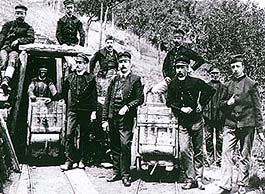Economic History in the Český Krumlov Region
 On the economic side the
region of Český Krumlov belonged to the poorer sub-mountain and
border regions with mainly farming and small manufacture trade.
Across the region of Český Krumlov during the medieval times, led a
path called the Linz Way, which went from the region of Linz in
Austria into Bohemia. Along this path many towns, villages castles
and monasteries sprouted during the 13th century. Guild manufacture
was typical for these small townships and towns and in the villages
and the countryside there was mainly a farming community. In the
15th and 16th centuries mining started to develop and flourish
around Český Krumlov, because of the silver deposits. During the
following centuries the mining of valuable metals diminished, but
the mining activity was revived during the 19th century , when they
started to mine black-lead (graphite) in the region. (History
of mining in the Český Krumlov Region).
On the economic side the
region of Český Krumlov belonged to the poorer sub-mountain and
border regions with mainly farming and small manufacture trade.
Across the region of Český Krumlov during the medieval times, led a
path called the Linz Way, which went from the region of Linz in
Austria into Bohemia. Along this path many towns, villages castles
and monasteries sprouted during the 13th century. Guild manufacture
was typical for these small townships and towns and in the villages
and the countryside there was mainly a farming community. In the
15th and 16th centuries mining started to develop and flourish
around Český Krumlov, because of the silver deposits. During the
following centuries the mining of valuable metals diminished, but
the mining activity was revived during the 19th century , when they
started to mine black-lead (graphite) in the region. (History
of mining in the Český Krumlov Region).
Manufacturing industry started to develop in the region of Český Krumlov only in the second half of the 19th century and the first third of the 20th century. The local industry developed slowly and the local character of small scale production still remained. (History of Guilds and Crafts in the Český Krumlov Region). The typical traditional industry for this region were the paper mills, cloth-making, mining and processing of timber, peat or the mining of graphite. The home handmade products, like the basic tools, utensils, furniture, matches and clogs, were produced using timber from the Šumava forests as the basic material.
The graphite mines in Český Krumlov, Hůrka and Černá v Pošumaví, ironworks in Holubov - Adolfov, textile factory in Zlatá Koruna and the paper mills in Český Krumlov, Větřní and Loučovice belonged to the most important industrial activities of this region. (History of Industrial Production in the Český Krumlov Region).

|

|
For the transportation of the natural resources and industrial products several important transport facilities were used, like the manmade Schwarzenberg Navigational Canal and the natural flow of the Vltava river, which were used for the transportation of timber from the Šumava forests. Only later the basic railway infrastructure started to develop - Horse - drawn Railway which led from České Budějovice to Linz, the Šumava railway from České Budějovice to Želnava and the Electric Railway Rybník - Lipno.
Further information:
History
of Farming in the Český Krumlov Region
History
of Transportation in the Český Krumlov Region
The
cobblers Vyšší Brod in the 17th century
The
stove fitters in Vyšší Brod in the 16th Century
The
weaving guild of Vyšší Brod
The
Bath custodians in Vyšší Brod
(mj)



